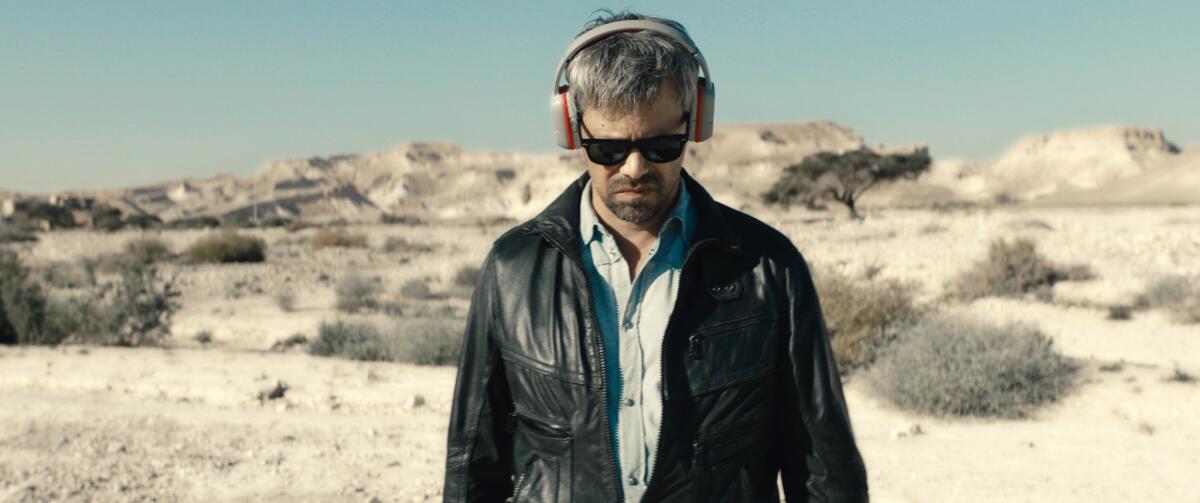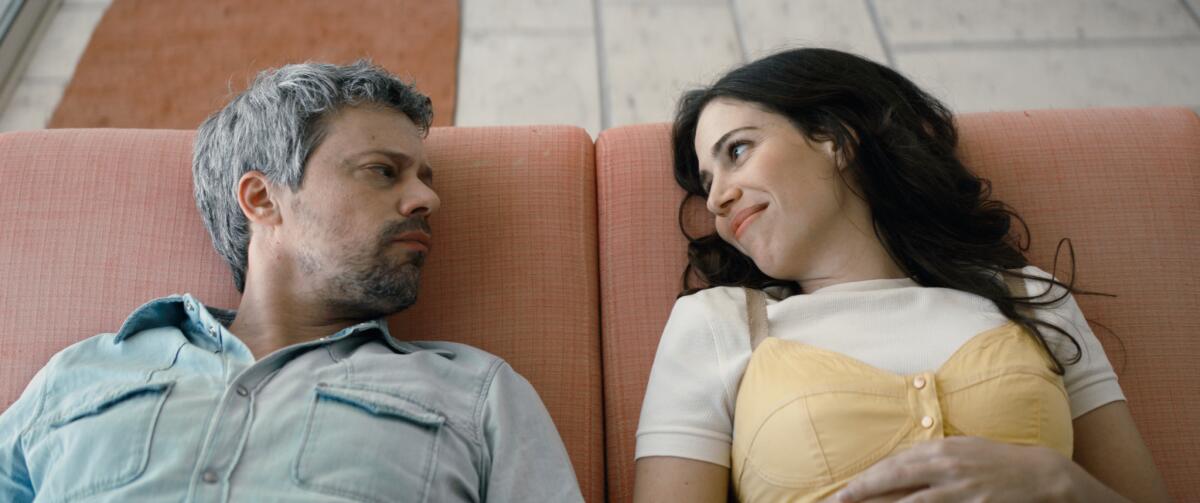The brilliant, incorrigible ‘Ahed’s Knee’ takes furious aim at contemporary Israel

- Share via
In December 2017, 16-year-old Palestinian activist Ahed Tamimi was videotaped slapping and punching two armed Israeli soldiers during a heated protest outside her home in the West Bank village of Nabi Salih. The video went viral, and Tamimi was arrested and sentenced to eight months in prison. Around that time, Bezalel Smotrich, a member of Israel’s legislature, tweeted that he wished the teenager had “gotten a bullet, at least in the kneecap. That would have put her under house arrest for the rest of her life.”
The fallout from that furious confrontation has inspired the title of a furious and confrontational new drama called “Ahed’s Knee.” But the movie, somehow both as hard as bone and as flexible as a joint, is not really about Tamimi. Nor does it show much interest in the Israeli-Palestinian conflict beyond a reference to this particular skirmish. Its protagonist is a middle-age Israeli writer-director known as Y (a superb Avshalom Pollak), who is clearly meant to be a fictional stand-in for the movie’s own middle-age Israeli writer-director, Nadav Lapid. Y is planning to film a video installation based on Tamimi’s ordeal, but it’s his own experience that comes under this movie’s forceful scrutiny.
For your safety
The Times is committed to reviewing theatrical film releases during the COVID-19 pandemic. Because moviegoing carries risks during this time, we remind readers to follow health and safety guidelines as outlined by the CDC and local health officials.
This isn’t the first time Lapid has drawn inspiration from his own life, as he did in his 2019 stunner, “Synonyms.” Nor is it the first time he has directed a blast of cinematic outrage at what he perceives to be the pervasive moral complacency and intellectual bankruptcy of contemporary Israeli society. His critique here takes the form of a journey into the Arava, a stretch of desert in southern Israel, where Y will attend a screening of one of his movies at a small-town library. Touching down on this arid, beautiful landscape, Y receives a warm welcome from Yahalom (Nur Fibak), a friendly young woman who works for the Ministry of Culture and who will serve as his host, dramatic foil and moral quandary.
Greeting Y with warm flattery and an accommodating smile, Yahalom asks him to sign a form that will limit his post-screening discussion to a series of pre-approved topics — a request that immediately raises Y’s hackles and confirms his worst fears about the overreaching hand of the state. When Yahalom quietly admits that she shares his concern and even his shame, Y sees a chance to expose her misgivings and, along with them, the hypocrisy of the totalitarian cultural apparatus that employs her — a scheme that, unfortunately, would ruin Yahalom in the bargain.
Something like this really happened to Lapid a few years ago, though there’s no reason to suspect this movie of being an accurate recounting of that episode. Lapid delights in turning actual events into hypotheticals, and part of the thrilling, present-tense excitement of “Ahed’s Knee” is that it seems as uncertain about what Y will do as he is.
As he ventures out into the open desert for a little sightseeing, taking in the region’s desolate beauty and marking his terrain (and at one point getting caught up in the incongruously sugary pop bliss of Vanessa Paradis’ “Be My Baby”), he gives voice to a blistering fury that eventually finds an unwilling but not uncomprehending ear in Yahalom.

“Suppose I want to discuss a nationalist, racist, sadistic, abject Jewish state,” he barks at her, “whose sole aim is to reduce the soul, particularly the Arab soul, to impotence and incompetence, so it collapses under the state’s oppression and will be completely at its mercy.” That’s quite an indictment, and it will surprise no one who’s seen Lapid’s “Synonyms,” in which a young man travels to France and tries to shed his Israeli identity like a carapace, or “The Kindergarten Teacher,” about the futile search for beauty and poetry in a nation seemingly incapable of appreciating them.
But Lapid doesn’t spare himself his own indictment, if indeed we are to understand Y to be himself. It’s telling that, whether or not you find yourself in agreement with Y’s thesis, liking him remains more or less impossible. Pollak’s performance is all rough, prickly edges, softening only when Y speaks tenderly on the phone with his ailing mother, one of his closest collaborators. (Lapid’s mother, film editor Era Lapid, died of lung cancer while they were working together on “Synonyms.”) Fibak, by contrast, can’t help but awaken your sympathies as Yahalom, who could hardly be described as innocent — her place within a larger scheme of collective culpability is part of the movie’s point — but whose quiet humility mounts its own unshakable defense against Y’s rhetorical offensive.
One thing nearly all Lapid’s movies share is an obsession with language, a concern for the precision of words but also an appreciation for their limitless possibilities. “Ahed’s Knee,” perhaps even more so than its predecessors, tries to explode the conventions of traditional movie language, to find a formal syntax that will match the ferocity of its broadsides.
Again and again in this movie (which was shot by Shai Goldman and edited by Nili Feller), the camera takes raw, inelegant flight, its restless, rattling whip pans often approximating Y’s own distracted eye movements. Sometimes Lapid directs your gaze heavenward, sometimes down at a parched landscape and sometimes at a closeup of something unexpected: a crotch, a foot, a knee.
It’s not pretty, and it doesn’t care. “Ahed’s Knee” means to shatter your complacency, and also the complacency of its chosen medium. You could see this as a childish act of revolt, or you could see it as Lapid, much like Y himself, refusing to submit to any agreed-upon parameters. He delights in coloring out of the lines, not least because he knows it will make all the right people mad.
‘Ahed’s Knee’
In Hebrew with English subtitles
Not rated
Running time: 1 hour, 40 minutes
Playing: Starts April 1 at Laemmle Glendale, Glendale; Laemmle Royal, West Los Angeles; and Laemmle Town Center 5, Encino
More to Read
Only good movies
Get the Indie Focus newsletter, Mark Olsen's weekly guide to the world of cinema.
You may occasionally receive promotional content from the Los Angeles Times.










